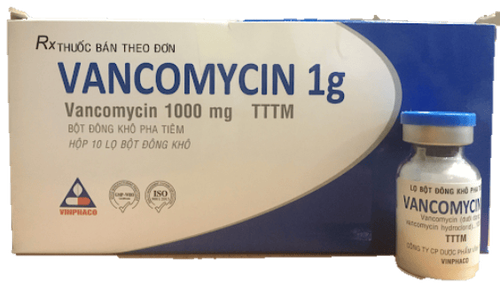This is an automatically translated article.
Streptomycin is an aminoglycoside antibiotic indicated for the treatment of multidrug-resistant mycobacterium tuberculosis and other non-tuberculosis infections. Although the drug Streptomycin was the first antibiotic available to treat mycobacterium tuberculosis, it is now mostly second choice due to resistance and toxicity.1. What is Streptomycin?
Streptomycin, an antibiotic derived from Streptomyces griseus, was the first aminoglycoside discovered and used in practice in the 1940s. Although streptomycin was the first antibiotic identified as effective against bacteria tuberculosis but it has fallen out of favor due to drug resistance and is now mainly used as adjuvant treatment in cases of multidrug-resistant TB.
Streptomycin is used with other medicines to treat an active TB infection if you cannot take other medicines for TB or have a type of TB that cannot be treated with other medicines (multi-drug resistant TB). medicine ). This medication may also be used to treat other serious infections (eg, Mycobacterium avium complex-MAC, typhus, endocarditis, bubonic plague).
2. How to take Streptomycin
Streptomycin is injected intramuscularly as directed by your doctor. Dosage is based on the patient's condition, weight, and response to therapy. Tests (such as kidney function, blood drug levels) may be done to help find the best dose for each patient. How often you get the shot and how long it takes will depend on the type of infection you have and your response to treatment.
TB medicines are usually used for 9 months or longer. After you take Streptomycin daily for 1 to 2 months, your doctor may direct you to take it less often (for example, 2 to 3 times a week). Your doctor may direct you to stop using this medicine before stopping other TB medicines. It is important that you continue to use Streptomycin and other medicines exactly as prescribed by your doctor.
Do not stop taking Streptomycin even for a short time, unless directed by your doctor. Skipping or changing the dosage without your doctor's approval can worsen side effects or make infections (especially tuberculosis) harder to treat (due to drug resistance).
Inform your doctor immediately if symptoms of infection reappear (eg fever, chills, body aches).
3. Streptomycin side effects
Some common side effects that can occur with Streptomycin injection include nausea, vomiting, abdominal pain or loss of appetite. In addition, symptoms such as pain, irritation, and redness may occur at the injection site.
Tell your doctor right away if you have any serious side effects, including: Muscle weakness, diarrhea that persists even after stopping the medicine, easy bleeding/bruising, heart palpitations, signs of a new infection, signs of kidney problems (change in the amount of urine), unusual tiredness.
Long-term or repeated use of Streptomycin can lead to oral thrush, a vaginal yeast infection. If you notice white patches in your mouth, a change in vaginal discharge or other new symptoms THEN see your doctor right away.

Sử dụng thuốc Streptomycin trong thời gian dài có thể dẫn đến nấm miệng.
4. Be careful when using Streptomycin
Before using this medicine, tell your doctor if you are allergic to streptomycin or to other aminoglycoside antibiotics (tobramycin, gentamicin) as well as to any other allergic conditions. Tell your doctor about your medical history, especially kidney problems, hearing problems, severe dehydration, certain muscle problems, burns over large areas of skin, fibrocystic cysts. Streptomycin should not be taken with certain vaccines that contain live bacteria (eg, typhoid, BCG). Talk to your doctor if you are planning on getting any vaccinations or therapy. Streptomycin should be used with caution in the elderly because they may have decreased kidney function. As a result, older adults may be more sensitive to kidney and hearing side effects. Streptomycin is not recommended for use during pregnancy and lactation. Tell your doctor if you are pregnant, plan to become pregnant, or if you want to breastfeed.
5. Drug interactions
Other drugs that can affect the kidneys or hearing may increase the risk of kidney damage or hearing loss if taken with streptomycin. Some common examples are non-steroidal anti-inflammatory drugs (NSAIDs), such as ibuprofen or naproxen, and the diuretic furosemide.
In summary, Streptomycin is an aminoglycoside antibiotic indicated for the treatment of multidrug-resistant mycobacterium tuberculosis and other non-tuberculosis infections. To limit the side effects as well as increase the effectiveness of treatment, patients should take the drug exactly as prescribed by the doctor.
Please dial HOTLINE for more information or register for an appointment HERE. Download MyVinmec app to make appointments faster and to manage your bookings easily.
Reference source: Webmd.com












